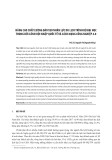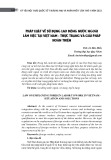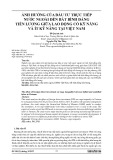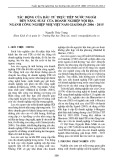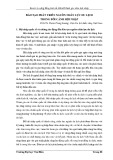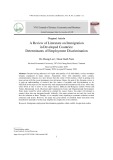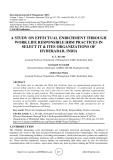
FTU Working Paper Series, Vol. 2 No. 4 (10/2021) | 1
SỰ HÀI LÒNG TRONG CÔNG VIỆC ẢNH HƯỞNG TỚI ĐỘ TRUNG THÀNH
CỦA NHÂN VIÊN: BÀI HỌC THỰC TẾ TỪ CÁC GIÁO VIÊN NƯỚC NGOÀI
TẠI HÀ NỘI
Vũ Hương Giang1
Sinh viên K56 CTTT Quản trị kinh doanh - Khoa Quản trị Kinh doanh
Trường Đại học Ngoại thương, Hà Nội, Việt Nam
Trần Minh Thu
Giảng viên Khoa Quản trị Kinh doanh
Trường Đại học Ngoại thương, Hà Nội, Việt Nam
Tóm tắt
Nghiên cứu này được thực hiện với mục đích xác định sự hài lòng trong công việc ảnh hưởng
tới độ trung thành của nhân viên như thế nào, trong trường hợp thực tế của các giáo viên nước ngoài
đang làm việc tại Hà Nội, Việt Nam. Khảo sát được thực hiện với sự giúp đỡ của 300 giáo viên
ngoại quốc đang sống tại Hà Nội, sử dụng thang đo Linkert 5 bậc và phương pháp định tinh. Các
tác giả đã áp dụng thống kê mô tả và phân tích hồi quy để đánh giá mức độ ảnh hưởng của sự hài
lòng trong công việc đối với mức độ trung thành của các giáo viên. Đầu tiên, các tác giả đã tham
khảo những công bố liên quan của các học giả trước đó để quyết định bảy yếu tố hài lòng công việc
có ảnh hưởng đến sự trung thành của nhân viên. Bảy yếu tố này là: Người giám sát, Đồng nghiệp,
Môi trường làm việc, Tiền lương, Sự thăng tiến, Sự ổn định, Sự công nhận. Sau quá trinh phân tích
và áp dụng Ma trận Xoay, bảy nguyên tố này được xếp vào ba nhóm chinh, đó là: Yếu tố ngoại vi,
Phúc lợi và Sự ổn định. Kết quả của nghiên cứu này thể hiện rằng độ hài lòng, sự giúp đỡ của cấp
trên, môi trường làm việc, phúc lợi, tinh ổn định và sự đào tạo có ảnh hưởng tích cực tới lòng trung
thành của nhân viên trong tổ chức. Dựa trên kết quả này, nghiên cứu cho rằng để đạt được mức độ
trung thành của nhân viên cao, các tổ chức giáo dục cần nâng cao sự hài lòng của nhân viên bằng
cách cải thiện môi trường làm việc, mối quan hệ, giúp đỡ của cấp trên và đồng nghiệp, gia tăng
phúc lợi và đảm bảo tính ổn định của vị trí công tác trong thời gian dài. Kết quả này đã đóng góp
1 Tác giả liên hệ, Email: vanessagianghvu@gmail.com
Working Paper 2021.2.4.1
- Vol 2, No 4

FTU Working Paper Series, Vol. 2 No. 4 (10/2021) | 2
to lớn tới những gợi ý của tác giả trong việc quản trị ở các tổ chức đã và đang có ý định tuyển dụng
giáo viên, giảng viên ngoại quốc.
Từ khóa: Sự trung thành của nhân viên, Hài lòng trong công việc, các yếu tố ảnh hưởng tới sự
trung thành của nhân viên, giáo viên nước ngoài, quản lý giáo dục.
HOW JOB SATISFACTION IMPACTS EMPLOYEE LOYALT
A CASE STUDY OF FOREIGN TEACHERS IN HANOI
Abstract
This study attempted to measure how job satisfaction impacts employee loyalty of foreign teachers
in Hanoi, Vietnam. The survey has been completed with the help of 300 non-Vietnamese teachers
living in Hanoi, using 5-point Linkert scale. Quantitative approach was the major method used. The
authors have implemented descriptive statistics and regression analysis to evaluate the impacts of
job satisfaction on teachers’ loyalty. The authors have first based on previous relevant publications
to decide the seven main factors of job satisfaction to impact employee loyalty that are: Supervisors,
Colleagues, Working Condition, Pay, Advancement, Security, Recognition. After the analysis
progress, these factors are assigned into three main groups by the Rotated Component Matrix,
which are: External Factors, Benefits and Security. The findings of this study indicated that the
higher levels of satisfaction, supervisor support, working environment, benefits, security, and
training were positively associated with the higher level of organizational loyalty. Based on the
results of the analysis, this study argued that to achieve high employee loyalty, educational
organizations should achieve high level of employee job satisfaction by enhancing working
environment quality, supervisors and peers’ support, increasing benefits and secure employees’
positions in a long term. This result has greatly contributed to the authors’ managerial suggestions
to organizations that are currently or about to employ foreign teachers and lecturers.
Keywords: Employee Loyalty, Job Satisfaction, factors to affect Employee Loyalty, foreign
teachers, educational management.
1. Introduction
Working as an English language teacher in Vietnam is becoming an increasingly attractive
choice for expats, especially English teachers, considering a move to the country, due to the rapid
expansion of the Vietnamese economy. There are around 74,000 foreigners working in Vietnam,
according to official statistics; however, this figure could be substantially higher if the number of
foreigners on tourist visas is included.
However, even though the market appears to be promising, it is difficult for schools or English
centers in Vietnam to recruit and retain qualified foreign teachers. The authors are motivated to
question the employee satisfaction of expats working in Vietnam education because of the low
level of employee loyalty among them. This is because employee satisfaction can be a critical
component in motivating teachers to remain in their positions. This research can shed light on how
employers should treat and motivate their employees in educational organizations to maximize the
firms’ productivity.
Moreover, this research can help proving that job satisfaction has a close connection to
employee loyalty in the Education section, as there are not many publications in Vietnam related
to this topic.

FTU Working Paper Series, Vol. 2 No. 4 (10/2021) | 3
This research specifically focuses on foreign teachers’ job satisfaction to give managerial
suggestions to elevate employee loyalty. Furthermore, due to time and funding restrictions, this
research is only carried out in Hanoi, which is a heavily populous city to which people from
everywhere have flocked. Also, the city has a high level of technological adoption and economic
development. Hence, results of the survey can be typical for the whole country. This investigation
is conducted out from March to May 2021.
Qualitative research methods were employed in this investigation. By using convenience
sampling, the authors were able to gather information from foreign instructors in Hanoi. In other
words, the authors distributed Google Doc Forms to members of the expat teachers' group to solicit
their comments on the subject. A subsequent analysis of the data is performed to determine
whether an improvement in job satisfaction can be associated with an increase in employee loyalty.
The objectives of this research are:
- To evaluate if there is a positive relationship between job satisfaction and employee loyalty
of foreign teachers in Hanoi;
- To classify job satisfactions of foreign teachers in Hanoi at the level of effect;
- To give managers’ suggestions to increase employee loyalty based on factors listed above.
2. Literature review
2.1. Job Satisfaction
Job satisfaction is any combination of psychological, physiological, and environmental factors
that causes a person to honestly claim that they are satisfied with their jobs, which Vroom (1964,
1985) has emphasized the employee's responsibility in the workplace. Job satisfaction is
inextricably tied to a person's behavior at work. Spector (1997) identifies three key characteristics
of job satisfaction.
Job satisfaction is under the influence of a series of factors such as: The nature of work, Salary,
Advancement, Opportunities, Management, Work groups and Work conditions.
Christen, Lyer and Soberman (2006) have demonstrated that both job factors and problems with
role perceptions can affect job performance and job satisfaction. Lawler and Porter's (1967) job
satisfaction model, which, unlike the previous model, lays a strong emphasis on the role of rewards
on job satisfaction.
Minnesota satisfaction survey and index of job descriptions is one of the most frequently used
tools to for assessing job satisfaction. This raises concerns about the following characteristics of
employment: Co-workers, Achievement, Activity, Advancement, Authority, Company Policies,
Compensation, Moral Values, Creativity, Independence, Security, Social Service, Social Status,
Recognition, Responsibility, Supervision, Human Relations, Supervision-Technical, Variety,
Working Conditions.
The Job Description Index is a widely used technique for determining job satisfaction. The
job description index considers the following factors: The nature of the work, Compensation and
benefits, Attitudes toward supervisors, Relationships with coworkers, and Promotion
opportunities.
2.2. Employee Loyalty
Employee loyalty (which is often understood as an attitude) to the organization has
occasionally been seen as an expectation. Employee loyalty is demonstrated when workers
continue to stay with their organizations (Solomon, 1992). They are committed to remain in the
organization, and further, they do not actively hunt for other work opportunities and are not

FTU Working Paper Series, Vol. 2 No. 4 (10/2021) | 4
attentive to job offers (The Loyalty Research Center, 1990). They have a strong belief and
acceptance of the organization's goals and principles, as well as a readiness to put up substantial
work on behalf of the organization. (Benttencourt, Gwinner and Meuter, 2001).
Bateman & Strasser (1984) argue that loyalty is a multi-pronged concept - willingness to work
for the organization, its goals and values, and the desire to maintain membership in the
organization. Mowday, Steer and Porter (1979) determined attitude and behavioral states related
to loyalty, employee's acceptance of the organization's values and goals, and willingness to act on
behalf of the organization.
Employee loyalty is often assessed using the Loyalty Questionnaire, and when it is not at a
high level, it can have significant negative consequences. When Vanderberg and Lance (1992)
interviewed 100 information services professionals over the course of five months, they identified
a strong association between job satisfaction and employee loyalty. According to their findings,
the larger one's level of job happiness, the greater one's level of employee loyalty is.
Recent related research and publications
Relationship between Job Satisfaction and Employee Loyalty that has been illustrated by
various publications in the most recent 10 years below
Job satisfaction, employee loyalty and job performance in the hospitality industry: a
moderated model
Tran and Tran (2020) applied structural equation modelling (SEM) and a multi-group analysis
to test four hypotheses, with data from 315 employees of lodging enterprises in Danang city,
Vietnam. Empirical results showed that: (1) job satisfaction has a positive direct impact on
employee loyalty and job performance; (2) employee loyalty positively affects job performance;
and (3) the effect on the relationship between job satisfaction and employee loyalty differs by job
position.
o Research model:
Figure 1. Job satisfaction, employee loyalty and job performance in the hospitality industry: a
moderated model
Source: Tran and Tran (2020)
Effect of Job Satisfaction to Employee Loyalty at the Oil and Gas Exploration and
Production Company in Vietnam
Employee Loyalty
Job Performance
Job Position
Job Satisfaction
H1
H2
H3

FTU Working Paper Series, Vol. 2 No. 4 (10/2021) | 5
Giao and Vu (2017) examines the impact of factors affecting employee loyalty at Oil and Gas
Exploration and Production companies in Vietnam, by surveying 421 employees. The results show
that the influence level of 04 factors measuring job satisfaction has a positive influence on
employee loyalty to the organization (decreasing importance): Income, Supervision, Colleagues
and Nature of Work.
o Research model:
Figure 2. Effect of Job Satisfaction to Employee Loyalty at the Oil and Gas Exploration and
Production Company in Vietnam
Source: Giao and Vu (2017)
The factors affecting employee’s satisfaction and loyalty: An evidence from people’s
committee of Binh Tan district, Ho Chi Minh city, Vietnam
Nguyen (2016) includes six variables, including four independent variables (empowerment,
salary and rewards, training, and career advancement opportunities), one dependent variable
(loyalty) and one intermediate variable (satisfaction), which correspond with five hypotheses. The
research is conducted on 170 staffs through a survey by the questionnaires. The results indicated
a remarkably positive correlation between satisfaction with salary and rewards as well as a positive
relation was also illustrated between the satisfaction with training and empowerment.
o Research model:
Income
Supervisor
Employee Loyalty
Colleagues
Promotion
Nature of work
Benefit




